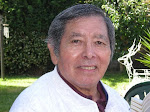ORAL LITERATURE
We must not confuse the Western meaning of “storytelling” with indigenous “oral literature.” The difference between oral literature and storytelling is that storytelling is viewed as amusement or something made up as an explanation to an officer of the law for your committing of an infraction.
Oral literature is the transference of valid and valuable history from one indigenous generation to the next. Tribal people upon this Western Hemisphere had little reason to record histories in writing because oral literature was an honored mode of remembering and this mode functioned well and the word was honored until the European invasion forced its way into this hemisphere bringing a strange God. Their God commanded them to immediately establishing Europe again. The European paradigm did not function well in Europe and caused Europe to sicken and decay in every imaginable degree and subject, but that pattern is all they had because they were devoid of dreams.
Despite the hegemonic effort of the invading people to annul oral literature, it retreated into whispers but refused to dissipate. It was passed from indigemous generation to the next generation in the safety of the forests as the embers smoldered, upon the Great Plains under the silver moon, and in the warmth and seclusion of a desert night, brilliant stars dancing.
The wisdoms were passed to the future generation by Pukamuka (wonderful wise people). Knowing was offered by the Elders and leaders. The person especially prepared to be responsible for and be the “keeper” of these things, received them with the understanding that they would be passed to the approaching generation in a very strict and respectful manner. As in every society, the person was selected because of his/her ability to employ wisdom with the proper language to make the narrative appear while divulging a thorough understanding.
Life, to native knowledge, guided with the indigenous community world-view, was not understood as beginning at birth and ending in a grave, but as a continuation of a journey that required necessary changes. That is why the statement, “Gone on ahead” is used. “Gone on ahead” and “Changing Worlds” is a way to indicate the life-spirit is traveling and may return with wisdom one day. Since wisdom usually comes in the form of a dream, we are told the life spirit follows this pattern. This activity also supports the lesson that everything is a dream. Not long ago dreams appeared to everyone with a destiny, destination and purpose - to the hunter who charmed the game, to the basket maker who designed magic, to the dreamer who dreamed dreams of future, to the medicine people preparing to heal the injured. The instructions to the people usually came in silence, solitude and sterling moments. Dreams are the most important element in our native “way” insuring the continuation of our Journey
There is a vast difference between “knowing” and “believing.” In our “way,” to know something is to enter into a greater positive, and remain. Wisdom then prepares to reveal tijtawa (the real, the genuine). The Elders say, “To know is to know is to know. There is no room for hesitation. To believe is a notion waiting for a convincing argument and it is always prepared to change and not remain constant.”
Everybody has a Wa’tu and Ahlo. These are umbilical cords, one physical the other spiritual. The ahlo connects you to this earth through your birth mother. The wa’tu connects you to the universe and all “power” everywhere. The wa’tu connects you to kenemmumwa (forever). The connections are of identical purposes.
Today the old ones worry, because the confusion of civilization and God, that too many young natives stand too far from the Fire of Wisdom and many have completely turned away, refusing to acknowledge wa’tu. The “new Indians for a new time,” (appointed by the government) are in peril and their claim to be accepted by the Great Power is invalid. Their dreams are a brown study at best and the only language they know is foreign and imported by the colonizer. With this strange language they mock the original “way.” In a panic to be “valid,” they collect fragments of different ceremonies, kneading them together while claiming that this is the way of their people. Elders turn from this practice shunning its brazenness. Beware. They are not appointed by the Great Sun Chief. They are frantic imposters.
The old ones worry while the new generation is lured away from destiny. Today they see a diluted and fabricated form of the “Old way,” and watch the “power” flee from this mockery.
An Elder described to me how he viewed the spiritual decay of our world-view and our “way.” “Tower 1, Columbus; Tower 2, Cortes.” Frightened I recall the words of an Elder when he told about first earth. “Two bad thinkings come and ruin first earth. Now this one.”
When my concern moves my thoughts to question what can be a medicine for the damage disrespect and civilization have had on little earth, the Elders shake their heads saying, “Only way now, Ye’ja, Ye’ja and powerful dreamings.”
In our lessons and legends Mother Earth was created with a variety of beautiful power songs. The powerful magic of song must now be invoked through the innocence of our children singing at dawn.
This is all I am allowed to know about future, the validity of oral literature and the ferocious error of comparing storytelling to oral literature and its connection with wisdom, knowledge and forever. I am sorry for my lack of a concentrated presentation. At this time I am absorbed in telling the beautiful narrative of a creation and in encouraging earth’s children to sing a healing song to Mother Earth. Our future is waiting for their song. Indigenous oral literature says this will happen.
Sul’ma’ejote (AKA)
Darryl Babe Wilson
Wednesday, May 19, 2010
Subscribe to:
Posts (Atom)
